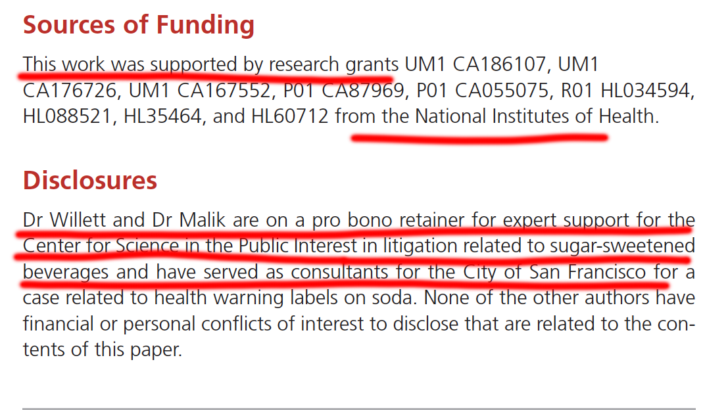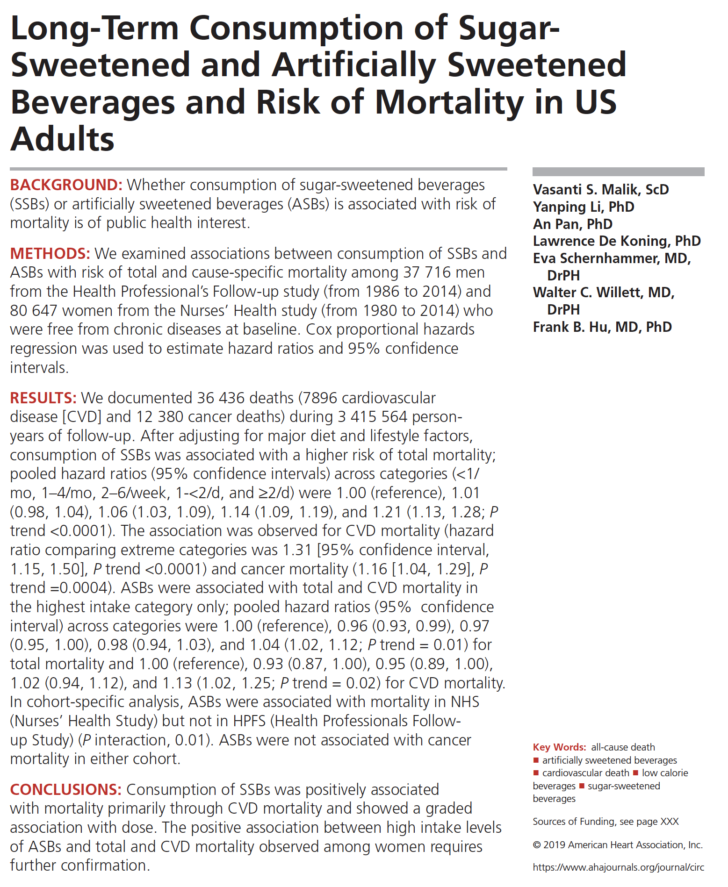A new study claims that drinking soda increases the risk of death. This is only true if you rip a soda can in half and slash your throat with it. So no, soda doesn’t kill… but the corruption will kill you.

What you need to know:
- The study data are unreliable self-reported memories from the perpetual junk science machine known as the Nurses Health Study. Past the unreliability of faulty memories concerning what subjects actually consumed, there is the problem that death is a complex, multivariable event. Most of the relevant data needed to determine actual causes of death is not captured in the Nurses Health Study.
- The statistical results are weak and within the noise range. Given that they are based on the crappy data described above, the reported associations have zero meaning — other than exculpatory one.
- Not one death was determined to have been actually caused by soda.
- I wouldn’t believe anything that study authors Walter Willett and Frank Hu publish. Both of a long history of practicing the art of junk science, some of which has previously been chronicled on this page.
Finally, please note these disclosures:

Note that your tax dollars (via the National Institutes of Health) are going to fund “researchers” who are really activists — for the food nanny Center for Science in the Public Interest and the City of San Francisco, which is trying to put warning labels on soda.
Not only are the researchers obviously biased against soda but tax dollars are funding their bias. Unbelievable.
The abstract is below, as are media releases from Harvard and the American Heart Association.
###

###
Higher consumption of sugary beverages linked with increased risk of mortality
HARVARD T.H. CHAN SCHOOL OF PUBLIC HEALTH
Boston, MA – The more sugar-sweetened beverages (SSBs) people consumed, the greater their risk of premature death–particularly death from cardiovascular disease, and to a lesser extent from cancer, according to a large long-term study of U.S. men and women. The risk of early death linked with drinking SSBs was more pronounced among women.
The study, led by Harvard T.H. Chan School of Public Health, also found that drinking one artificially sweetened beverage (ASB) per day instead of a sugary one lowered the risk of premature death. But drinking four or more ASBs per day was associated with increased risk of mortality in women.
The study will be published March 18, 2019 in the journal Circulation.
“Our results provide further support to limit intake of SSBs and to replace them with other beverages, preferably water, to improve overall health and longevity,” said Vasanti Malik, research scientist in the Department of Nutrition and lead author of the study.
Studies have shown that SSBs–carbonated and noncarbonated soft drinks, fruit drinks, energy drinks, and sports drinks–are the single largest source of added sugar in the U.S. diet. Although SSB consumption in the U.S. has been dropping over the past decade, there’s been a recent uptick among adults, with intake levels from SSBs alone nearly exceeding the dietary recommendation for consuming no more than 10% of daily calories from added sugars. SSB intake is also on the rise in developing countries, spurred by urbanization and beverage marketing, according to the authors.
Previous studies have found links between SSB intake and weight gain and higher risk of type 2 diabetes, heart disease, and stroke, although few have looked at the connection between SSB intake and mortality. In the new study, researchers analyzed data from 80,647 women participating in the Nurses’ Health Study (1980-2014) and from 37,716 men in the Health Professionals Follow-up Study (1986-2014). For both studies, participants answered questionnaires about lifestyle factors and health status every two years.
After adjusting for major diet and lifestyle factors, the researchers found that the more SSBs a person drank, the more his or her risk of early death from any cause increased. Compared with drinking SSBs less than once per month, drinking one to four sugary drinks per month was linked with a 1% increased risk; two to six per week with a 6% increase; one to two per day with a 14% increase; and two or more per day with a 21% increase. The increased early death risk linked with SSB consumption was more pronounced among women than among men.
There was a particularly strong link between drinking sugary beverages and increased risk of early death from cardiovascular disease. Compared with infrequent SSB drinkers, those who drank two or more servings per day of SSBs had a 31% higher risk of early death from CVD. Each additional serving per day of SSBs was linked with a 10% increased higher risk of CVD-related death.
Among both men and women, there was a modest link between SSB consumption and early death risk from cancer.
Researchers also looked at the association between drinking artificially sweetened beverages (ASBs) and risk of early death. They found that replacing SSBs with ASBs was linked with a moderately lower risk of early death. But they also found a link between high intake levels of ASBs (at least four servings/day) and slightly increased risk of both overall and CVD-related mortality among women, so they cautioned against excessive ASB consumption.
“These findings are consistent with the known adverse effects of high sugar intake on metabolic risk factors and the strong evidence that drinking sugar-sweetened beverages increases the risk of type 2 diabetes, itself a major risk factor for premature death. The results also provide further support for policies to limit marketing of sugary beverages to children and adolescents and for implementing soda taxes because the current price of sugary beverages does not include the high costs of treating the consequences,” said Walter Willett, professor of epidemiology and nutrition.
Other Harvard Chan authors of the study included Yanping Li, Eva Schernhammer, and Frank Hu.
###
Sugary drinks may be associated with an increased risk of death from cardiovascular diseases
Circulation Journal Report
AMERICAN HEART ASSOCIATION
DALLAS, March 18, 2019 — Frequently drinking sugar-sweetened drinks, such as sodas and sports drinks, was associated with an increased risk of death from cardiovascular diseases and, to a lesser extent, cancers, according to new research in the American Heart Association’s journal Circulation.
Among study participants the risk of death rose as people drank more sugar-sweetened drinks. In addition, substituting one sugary drink a day with an artificially sweetened drink was associated with a slightly lower risk of dying, but drinking four or more artificially sweetened drinks a day was associated with a higher risk of death among women. This finding is not considered as strong as the association between sugary drinks and a potential link to an increased risk of death and needs to be confirmed with additional research.
“Drinking water in place of sugary drinks is a healthy choice that could contribute to longevity,” said Vasanti Malik, Sc.D., lead author on the paper and a research scientist in the Department of Nutrition in the Harvard T.H. Chan School of Public Health in Boston, Massachusetts. “Diet soda may be used to help frequent consumers of sugary drinks cut back their consumption, but water is the best and healthiest choice.”
Although people have been drinking fewer sugary drinks in the United States in the past decade, soda and other sweetened drinks still represent the single largest source of added sugar in the U.S. diet and their consumption is on the rise around the world.
Much attention has been given to a potential link between soft drinks, weight gain and health problems related to weight gain such as cardiovascular disease and diabetes. But few studies have examined whether sugar-sweetened beverages or artificially sweetened beverages can be linked to mortality.
The current study used data from two large-scale longitudinal studies to do just that. Researchers examined data from 37,716 men in the Health Professionals follow-up study and 80,647 women in the Nurses’ Health Study. They controlled for other dietary factors, physical activity and body mass index so that any effect measured could be independently linked with sugar-sweetened beverages. It also examined the association between drinking artificially sweetened beverages and death.
The American Heart Association recently issued a science advisory on artificially sweetened drinks that concludes that for adults who are habitually high consumers of sugary drinks, low-calorie sweetened drinks (artificially sweetened) may be a useful replacement strategy to reduce intake of sugary drinks. This approach may be particularly helpful for persons who are habituated to a sweet-tasting drink as they transition to water.
###